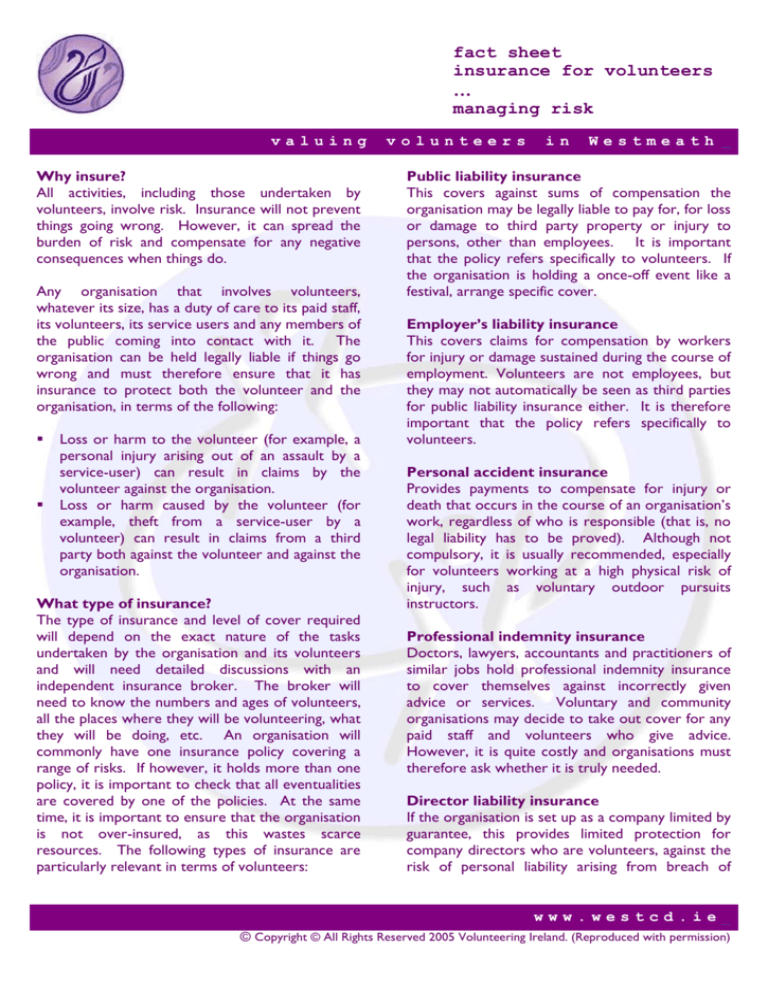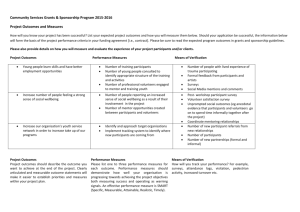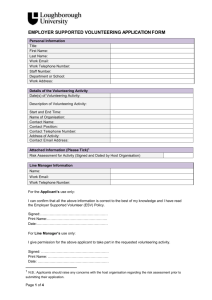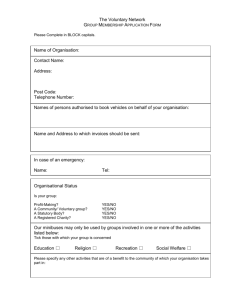
fact sheet
insurance for volunteers
…
managing risk
valuing
Why insure?
All activities, including those undertaken by
volunteers, involve risk. Insurance will not prevent
things going wrong. However, it can spread the
burden of risk and compensate for any negative
consequences when things do.
Any organisation that involves volunteers,
whatever its size, has a duty of care to its paid staff,
its volunteers, its service users and any members of
the public coming into contact with it. The
organisation can be held legally liable if things go
wrong and must therefore ensure that it has
insurance to protect both the volunteer and the
organisation, in terms of the following:
Loss or harm to the volunteer (for example, a
personal injury arising out of an assault by a
service-user) can result in claims by the
volunteer against the organisation.
Loss or harm caused by the volunteer (for
example, theft from a service-user by a
volunteer) can result in claims from a third
party both against the volunteer and against the
organisation.
What type of insurance?
The type of insurance and level of cover required
will depend on the exact nature of the tasks
undertaken by the organisation and its volunteers
and will need detailed discussions with an
independent insurance broker. The broker will
need to know the numbers and ages of volunteers,
all the places where they will be volunteering, what
they will be doing, etc. An organisation will
commonly have one insurance policy covering a
range of risks. If however, it holds more than one
policy, it is important to check that all eventualities
are covered by one of the policies. At the same
time, it is important to ensure that the organisation
is not over-insured, as this wastes scarce
resources. The following types of insurance are
particularly relevant in terms of volunteers:
volunteers
in
Westmeath _
Public liability insurance
This covers against sums of compensation the
organisation may be legally liable to pay for, for loss
or damage to third party property or injury to
persons, other than employees. It is important
that the policy refers specifically to volunteers. If
the organisation is holding a once-off event like a
festival, arrange specific cover.
Employer’s liability insurance
This covers claims for compensation by workers
for injury or damage sustained during the course of
employment. Volunteers are not employees, but
they may not automatically be seen as third parties
for public liability insurance either. It is therefore
important that the policy refers specifically to
volunteers.
Personal accident insurance
Provides payments to compensate for injury or
death that occurs in the course of an organisation’s
work, regardless of who is responsible (that is, no
legal liability has to be proved). Although not
compulsory, it is usually recommended, especially
for volunteers working at a high physical risk of
injury, such as voluntary outdoor pursuits
instructors.
Professional indemnity insurance
Doctors, lawyers, accountants and practitioners of
similar jobs hold professional indemnity insurance
to cover themselves against incorrectly given
advice or services. Voluntary and community
organisations may decide to take out cover for any
paid staff and volunteers who give advice.
However, it is quite costly and organisations must
therefore ask whether it is truly needed.
Director liability insurance
If the organisation is set up as a company limited by
guarantee, this provides limited protection for
company directors who are volunteers, against the
risk of personal liability arising from breach of
www.westcd.ie_
© Copyright © All Rights Reserved 2005 Volunteering Ireland. (Reproduced with permission)
fact sheet series
valuing
trust. It does not cover losses as a result of illegal
actions and is not the same as the organisation
indemnifying itself against a loss to its funds
resulting from the acts and defaults of its trustees.
Vehicle insurance
This is a legal requirement to cover against any
claims arising out of an organisation having vehicles
on the road. If the vehicles are owned by the
organisation, it must ensure any volunteer drivers
are covered under the policy. If volunteers are
using their own cars during the course of
volunteering, it is important that their own
insurance policy covers them for this. Most
insurance companies extend cover for minimal or
no cost. It is vital that the organisation holds
written confirmation for the cover.
Finding the right policy
Affordability of insurance is a major issue for the
voluntary and community sector.
Insurance
premium rates have increased across the board in
recent years, causing significant hardship to many
organisations. Unlike the private sector, groups in
the sector are rarely in a position to pass on the
increased costs to their clients or members. Some
insurers are even withdrawing totally of what they
perceive as high-risk areas. Rather than reducing
or cutting services completely, it is worth talking in
detail to insurers about exactly what you do or
intend to do; they may simply not be aware of the
exact nature of your work. In addition, it is worth
carrying out risk assessments on all volunteer roles
before looking for (new) insurance in order to
minimise risks and thus avoid spiralling costs, such
assessments consist of the following:
volunteering _
Comhairle has a Group Insurance Scheme for
Voluntary
Social
Services
Organisations
underwritten by Allianz Insurance plc. Further
details may be obtained on (01) 462 0444 or
comhairle.tallaght@comhairle.ie.
February 16
Newsflash!!!
Better Insurance - up to
40% saving typical for
Community & Voluntary
Groups
Contact us @
Volunteer Westmeath
e ioflynn@westcd.ie
w www.westcd.ie
(Reproduced with the kind permission of Volunteering
Ireland. www.volunteeringireland.ie )
identify risks
evaluate risks
take steps to control risks
review risks regularly.
www.volunteerlimerick.com
© Copyright © All Rights Reserved 2005 Volunteering Ireland. (Reproduced with permission)







